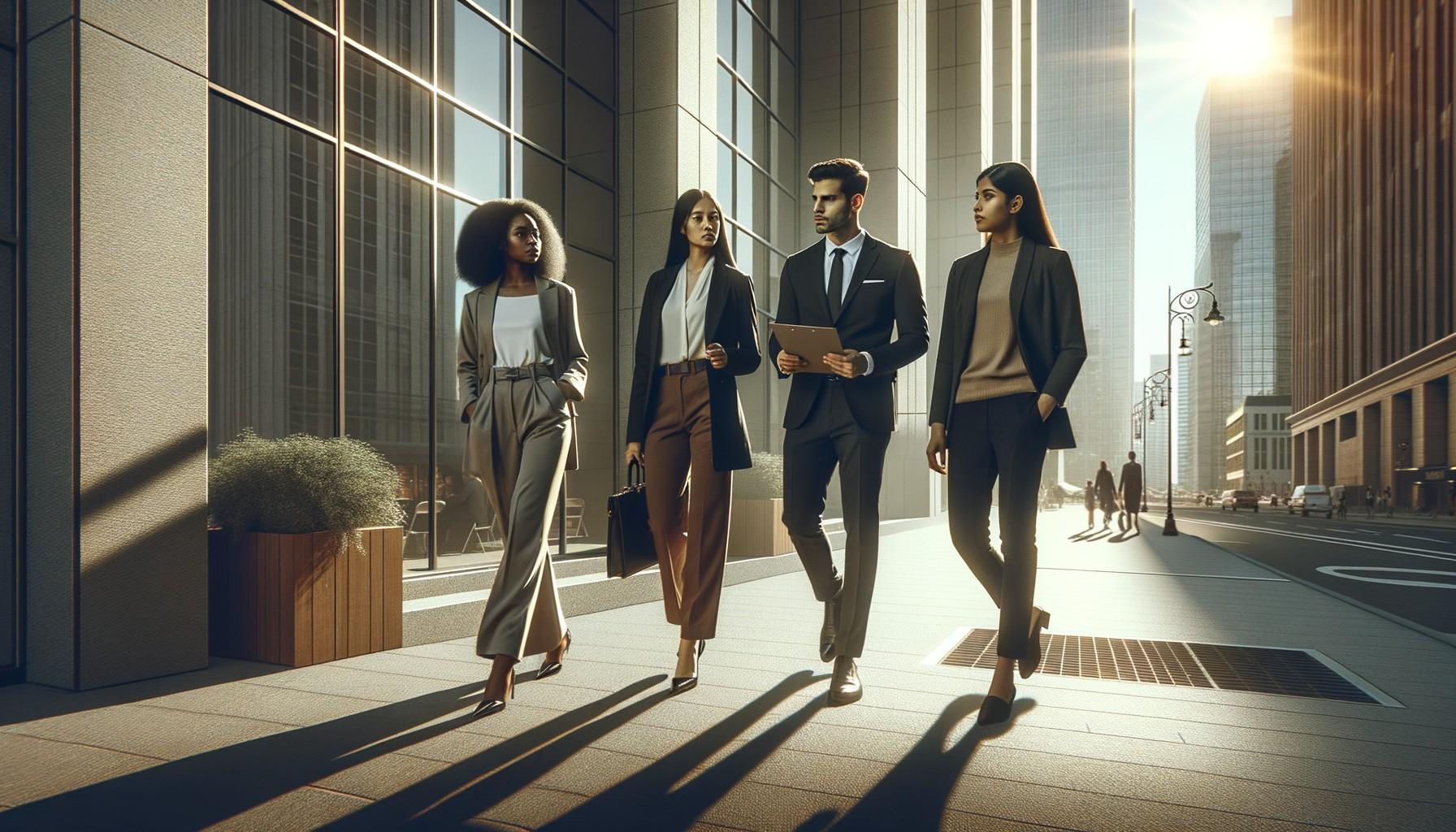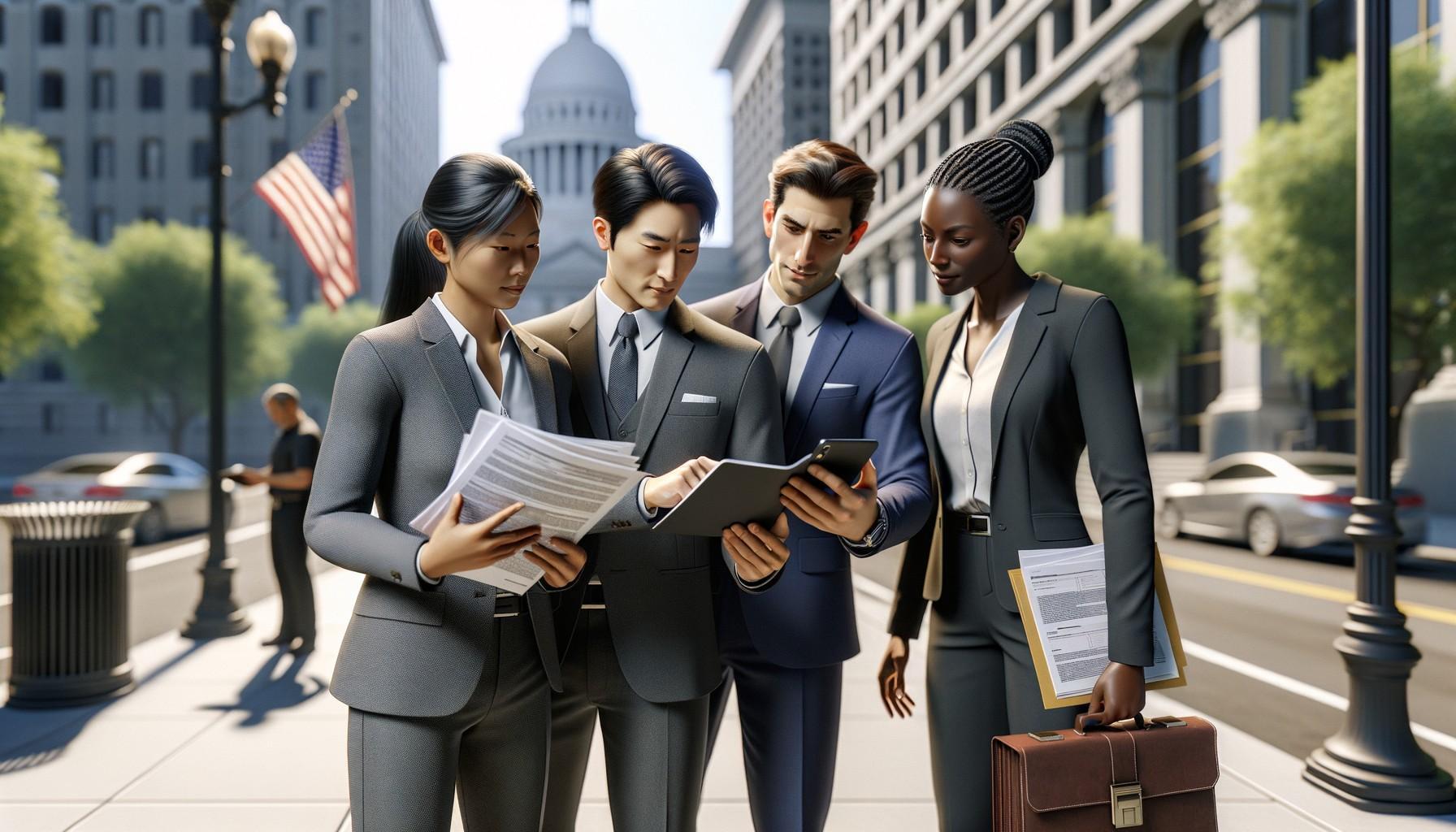
Which Group Can Obtain Green Cards?
Green cards open doors to permanent residency in the United States, but understanding which groups possess green card eligibility can be complex.
At Law Offices of Jeffrey A. Thompson, we often field questions about the various pathways to obtaining this coveted status.
From employment-based categories to family sponsorship and special programs, the U.S. immigration system offers multiple avenues for individuals seeking to make America their permanent home.
Who Qualifies for Employment-Based Green Cards?
Employment-based green cards provide a path to permanent residency for skilled professionals and investors. The U.S. government distributes these visas across five preference categories, each tailored to different levels of expertise and investment capabilities.

Priority Workers (EB-1)
The EB-1 category caters to individuals with extraordinary abilities in sciences, arts, education, business, or athletics. It also includes outstanding professors, researchers, and multinational executives or managers. Applicants in this category often skip the labor certification process, which results in a faster route to permanent residency. The employment-based (EB) annual limit for fiscal year (FY) 2025 will be higher than was typical before the pandemic, though lower than in FY 2021-2024.
Advanced Degree Professionals and Exceptional Ability (EB-2)
This category targets professionals with advanced degrees or those with exceptional ability in sciences, arts, or business. A job offer and labor certification are typically necessary, unless the applicant qualifies for a National Interest Waiver. The Department of Labor reports that the average processing time for labor certification in 2024 was about 6 months, which underscores the importance of early preparation for this category.
Skilled Workers, Professionals, and Other Workers (EB-3)
EB-3 visas accommodate skilled workers with at least two years of job experience, professionals with bachelor’s degrees, and other workers for unskilled labor. This category often faces longer wait times due to high demand. In FY 2023, the employment-based limit was 197,091 visas, which illustrates the competitive nature of this category.
Special Immigrants (EB-4)
The EB-4 category applies to specific groups such as religious workers, certain U.S. government employees abroad, and other special immigrants. This category has unique requirements and often requires specialized knowledge to navigate successfully.
Immigrant Investors (EB-5)
The EB-5 program allows foreign investors to obtain permanent residency by investing a substantial amount (typically $1.8 million, or $900,000 in targeted employment areas) in a new commercial enterprise that creates at least 10 full-time jobs for U.S. workers. This program has gained popularity among high-net-worth individuals seeking to immigrate to the United States.
The employment-based green card categories offer diverse opportunities for skilled professionals and investors. However, the application process can be complex and time-consuming. Professional legal guidance (such as that provided by the Law Offices of Jeffrey A. Thompson) can prove invaluable in navigating these intricate requirements and potential pitfalls, ultimately maximizing an applicant’s chances of success.
As we shift our focus to family-based green cards, it’s important to note that these categories represent another significant pathway to permanent residency in the United States.
Who Can Apply for Family-Based Green Cards?
Family-based green cards provide a pathway to permanent residency in the United States. These visas allow U.S. citizens and lawful permanent residents to sponsor certain family members for immigration.
Immediate Relatives of U.S. Citizens
Immediate relatives of U.S. citizens receive the most favorable treatment in the family-based immigration system. This category includes:
- Spouses of U.S. citizens
- Unmarried children under 21 of U.S. citizens
- Parents of U.S. citizens (if the U.S. citizen is at least 21 years old)
The Department of Homeland Security reports that in fiscal year 2023, about 476,000 immediate relatives of U.S. citizens received green cards (approximately 40% of all new lawful permanent residents).

Immediate relatives benefit from no annual numerical limits on these visas. This allows eligible applicants to typically receive their green cards more quickly than those in other family-based categories.
Family Preference Categories
For family members who don’t qualify as immediate relatives, the family preference system offers alternative pathways. These categories have annual numerical limits and often involve longer wait times. The four main family preference categories are:
- First Preference (F1): Unmarried sons and daughters of U.S. citizens
- Second Preference (F2A): Spouses and children of lawful permanent residents
- Second Preference (F2B): Unmarried sons and daughters of lawful permanent residents
- Third Preference (F3): Married sons and daughters of U.S. citizens
- Fourth Preference (F4): Siblings of U.S. citizens
The U.S. Department of State’s Visa Bulletin, updated monthly, provides information on current priority dates for these categories. As of May 2025, some applicants in the F4 category from the Philippines have waited since 2002, which illustrates the potential for lengthy processing times in certain categories.
K-1 Fiancé(e) Visa Holders
K-1 visa holders enter the U.S. to marry their U.S. citizen fiancé(e)s and have a unique path to permanent residency. Within 90 days after being admitted as a K-1 nonimmigrant, the alien must enter into a bona fide marriage with the U.S. citizen who filed the petition. In fiscal year 2023, the U.S. issued approximately 23,000 K-1 visas (according to the U.S. Department of State).
K-1 visa holders must understand that failure to marry within the 90-day period can result in a loss of legal status and potential removal from the United States.
Widow(er)s of U.S. Citizens
Widow(er)s of U.S. citizens may self-petition for a green card if they were married to the U.S. citizen at the time of their spouse’s death. They must file the petition within two years of the spouse’s death. This provision helps ensure that individuals who have lost their U.S. citizen spouses are not unfairly disadvantaged in the immigration process.
The family-based green card process involves various eligibility requirements, documentation needs, and potential challenges. Professional legal guidance can prove invaluable in navigating these intricate procedures and maximizing the chances of approval.
As we move forward, we will explore another significant pathway to permanent residency in the United States: the Diversity Visa Program and other special categories.
How Special Programs Lead to Green Cards
The U.S. immigration system offers several unique pathways to permanent residency beyond employment and family-based categories. These special programs cater to diverse groups, from individuals seeking protection to those with long-standing ties to the United States.

Diversity Immigrant Visa Program
The Diversity Immigrant Visa Program (also known as the green card lottery) provides immigrant visas annually to individuals from countries with low rates of immigration to the United States. The U.S. Department of State provides statistics on the number of online entries received during each registration period for the DV program.
Applicants must meet specific educational or work experience requirements and be natives of eligible countries. The application period opens for only one month each year (typically in October). Many applicants overlook the strict photo requirements, which can lead to disqualification. Professional guidance can help ensure your application meets all criteria.
Asylum and Refugee Status
Individuals who flee persecution in their home countries may qualify for asylum or refugee status, which can lead to permanent residency.
Asylum seekers must apply within one year of arriving in the U.S. (unless they can demonstrate changed or extraordinary circumstances). Refugees apply for this status from outside the U.S. Both groups can apply for a green card one year after being granted their respective statuses.
Special Immigrant Juvenile Status
This program provides a path to permanent residency for certain children who have experienced abuse, abandonment, or neglect by one or both parents. To qualify, applicants must be under 21, unmarried, and have a juvenile court order declaring them dependent on the court or placing them under the custody of a state agency or individual.
The U.S. Citizenship and Immigration Services (USCIS) provides data on receipts, approvals, denials, and pending applications for various immigration benefits, including Special Immigrant Juvenile Status. This program offers a crucial lifeline for vulnerable young people, but navigating the complex intersection of immigration and family law can challenge applicants without expert guidance.
Registry Provisions for Long-Term Residents
The registry provision of the Immigration and Nationality Act allows certain individuals who have resided continuously in the United States since before January 1, 1972, to apply for permanent resident status. While this date has not changed in decades (making it increasingly rare for individuals to qualify), it remains an option for a small subset of long-term residents.
Applicants must demonstrate good moral character and be eligible for naturalization (except for the residency requirement). They must not be inadmissible on certain grounds, such as criminal activity or national security concerns.
These special programs offer unique opportunities for individuals who might not qualify under traditional employment or family-based categories. However, they often involve complex eligibility requirements and application procedures. Many applicants underestimate the intricacies of these processes, potentially jeopardizing their chances of success. Professional legal guidance (such as that provided by the Law Offices of Jeffrey A. Thompson) can prove instrumental in navigating these pathways effectively and maximizing the likelihood of a favorable outcome.
Final Thoughts
The U.S. immigration system offers multiple pathways for various groups to obtain green cards. Employment-based categories cater to skilled professionals and investors, while family-based options prioritize immediate relatives of U.S. citizens. Special programs like the Diversity Visa lottery, asylum, and refugee status further expand opportunities for diverse groups to achieve permanent residency.
Professional legal guidance proves invaluable when navigating the complex immigration landscape. Many applicants underestimate the intricacies involved, which can jeopardize their chances of success. Understanding which group possesses green card eligibility is essential for a smooth application process.
Law Offices of Jeffrey A. Thompson specializes in guiding clients through the intricate process of obtaining green cards. Our expertise spans various immigration matters, from assisting with paperwork to overcoming legal hurdles. We provide compassionate and knowledgeable legal representation tailored to your specific needs.


